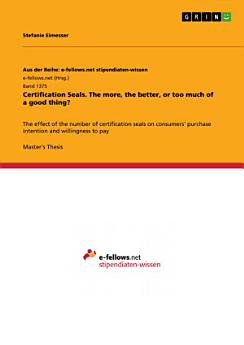Certification Seals. The more, the better, or too much of a good thing?: The effect of the number of certification seals on consumers’ purchase intention and willingness to pay
Stefanie Eimesser
Jun 2015 · Aus der Reihe: e-fellows.net stipendiaten-wissen · GRIN Verlag
Ebook
228
Pages
family_home
Eligible
info
reportRatings and reviews aren’t verified Learn More
About this ebook
Master's Thesis from the year 2013 in the subject Business economics - Offline Marketing and Online Marketing, grade: 8.5 (out of 10.0), Erasmus University Rotterdam (Rotterdam School of Management), course: Marketing Management, language: English, abstract: This thesis investigated whether and how consumers’ purchase intention and willingness to pay for food products are affected by the number of certification seals and the level of pretension of a product benefit claim presented on the product packaging. Its objective was to find the ideal number of seals and level of claim pretentiousness where purchase intention and willingness to pay are highest and to give an explanation about consumers’ thought processes that may lead to this outcome. To this end, the role of consumers’ perception of the product quality and the manufacturer conscientiousness has been taken into consideration. With reference to existing literature on product certification as well as concepts originating from human information processing theory and advertising research this study suspected that consumer attitudes and purchase intentions first increase up to a maximum point before decreasing again as the number of certification seals being employed simultaneously rises. The author furthermore hypothesized that consumers react negatively to a more pretentious benefit claim in terms of less favourable product and manufacturer attitudes and lower purchase intentions. The interaction effect of the number of seals and the pretentiousness of a benefit claim on manufacturer conscientiousness perception, product quality perception, purchase intention and willingness to pay was assumed to be likewise of inverted-U nature after the presence of a certification seal has offset the negative effect of a pretentious claim. These hypotheses about the direct impact of the two types of extrinsic product attributes as well as additional hypotheses about the mediating role of product quality perception and manufacturer conscientiousness perception in the relationships between the extrinsic product attributes and consumers’ purchase intentions have been tested by means of a survey-based framed field experiment in a real-world retail environment. A factorial 5 (# of seals: 0,1,2,3,4) x 2 (claim: modest, pretentious) between-subject research design exposed grocery shoppers randomly to one of 10 different experiment conditions consisting of jars of jam of a fictive brand with a different number and combination of the 4 seals ‘BIO', ‘Bioland’, ‘Demeter’ and ‘Naturland’, and the two organic claims “Simply organic” and “More organic does not exist!”. The collected primary data has been analysed by means of multivariate Analysis of Variance and Regression Analysis.
Rate this ebook
Tell us what you think.
Reading information
Smartphones and tablets
Install the Google Play Books app for Android and iPad/iPhone. It syncs automatically with your account and allows you to read online or offline wherever you are.
Laptops and computers
You can listen to audiobooks purchased on Google Play using your computer's web browser.
eReaders and other devices
To read on e-ink devices like Kobo eReaders, you'll need to download a file and transfer it to your device. Follow the detailed Help Center instructions to transfer the files to supported eReaders.




